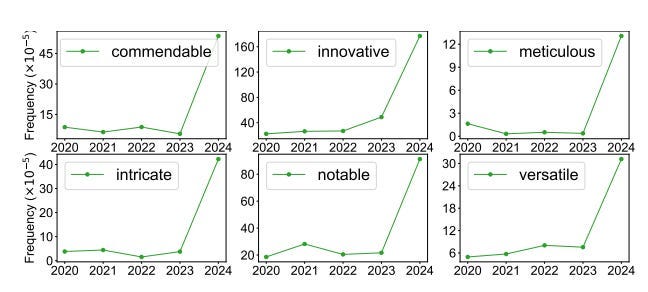The Rise of AI in Scientific Peer Reviews: A New Era
Written on
Chapter 1: Overview of AI's Impact on Peer Reviews
Recent findings highlight a significant surge in AI-generated content within scientific peer reviews. Researchers have discovered a method to identify the extent of AI influence in the review processes of leading machine learning conferences. This trend raises important concerns regarding the integrity and credibility of scientific research.
As AI writing tools gain traction, their role in shaping peer reviews is becoming increasingly evident.
Section 1.1: Research Methodology
The study, titled "Monitoring AI-Modified Content at Scale: A Case Study on the Impact of ChatGPT on AI Conference Peer Reviews," presents a novel technique known as "distributional GPT quantification." This method allows researchers to estimate the proportion of text that is significantly altered or created by AI. The researchers applied this technique to reviews from prominent AI conferences, including ICLR, NeurIPS, CoRL, and EMNLP, analyzing data from before and after the introduction of ChatGPT in 2022.
Subsection 1.1.1: How the Method Works

The methodology involves several key steps:
- Assemble a dataset of known human-written and AI-generated texts for reference.
- Analyze token usage distributions between the two to estimate AI content in target reviews.
- Employ a mixture model to infer the proportion of AI-generated text using maximum likelihood estimation.
Section 1.2: Results and Findings
The application of this method revealed a marked increase in AI-generated content in peer reviews following the introduction of ChatGPT. Estimates indicate that 10.6% of ICLR 2024 reviews, 9.1% of NeurIPS 2023 reviews, 6.5% of CoRL 2023 reviews, and a striking 16.9% of EMNLP 2023 reviews contained substantial AI content, a significant rise from the pre-ChatGPT era of approximately 1-2%.
Chapter 2: The Implications of AI in Peer Review
The findings of this study raise serious questions about the future of scientific validation processes.
The video "AI Just Changed Everything … Again" explores the transformative effects of AI on various sectors, including scientific research.
Section 2.1: Understanding the Trends
The authors investigated factors contributing to increased AI content in reviews. Key observations included:
- Reviews submitted near deadlines showed higher AI involvement.
- Those with academic citations tended to have lower AI content.
- Reviewers less engaged in rebuttals displayed higher AI estimates.
- AI-generated reviews exhibited greater textual similarity, indicating reduced diversity in perspectives.
- Reviewers who lacked confidence in their evaluations were more likely to rely on AI tools.
The video "ITU AI For Good Global Summit 2023 Press conference (Unedited)" discusses the intersection of AI and ethics in various fields, including research.
Section 2.2: Limitations and Future Directions
While this study provides critical insights into AI's impact on peer review, it is essential to acknowledge its limitations:
- The method might underestimate AI's influence by not accounting for more subtle assistance.
- The correlation between AI usage and review quality requires further investigation to establish causation.
- As AI technology evolves, the reliability of detection techniques may wane, necessitating continuous adaptation.